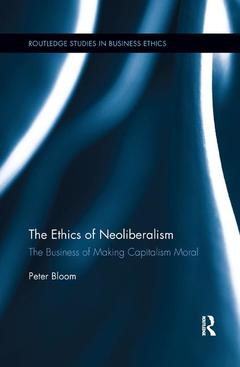The Ethics of Neoliberalism The Business of Making Capitalism Moral Routledge Studies in Business Ethics Series
Auteur : Bloom Peter

The 21st century is the age of "neo-liberalism" ? a time when the free market is spreading to all areas of economic, political and social life. Yet how is this changing our individual and collective ethics? Is capitalism also becoming our new morality? From the growing popular demand for corporate social responsibility to personal desire for "work-life balance" it would appear that non-market ideals are not only surviving but also thriving. Why then does it seem that capitalism remains as strong as ever?
The Ethics of Neoliberalism boldly proposes that neoliberalism strategically co-opts traditional ethics to ideologically and structurally strengthen capitalism. It produces "the ethical capitalist subject" who is personally responsible for making their society, workplace and even their lives "more ethical" in the face of an immoral but seemingly permanent free market.
Rather than altering our morality, neoliberalism "individualizes" ethics, making us personally responsible for dealing with and resolving its moral failings. In doing so, individuals end up perpetuating the very market system that they morally oppose and feel powerless to ultimately change.
This analysis reveals the complex and paradoxical way capitalism is currently shaping us as "ethical subjects". People are increasingly asked to ethically "save" capitalism both collectively and personally. This can range from the "moral responsibility" to politically accept austerity following the financial crisis to the willingness of employees to sacrifice their time and energy to make their neoliberal organizations more "humane" to the efforts by individuals to contribute to their family and communities despite the pressures of a franetic global business environment. Neoliberalism, thus, uses our ethics against us, relying on our "good nature" and sense of personal responsibility to reduce its human cost in practice. Ironically
1. The Paradox of Neoliberal Ethics
2. Producing the Ethical Capitalist Subject
3.The Ethical Power of Neoliberalism
4.The Political Power of Neoliberal Ethics
5.The Institutional Power of Neoliberal Ethics
6.The Personal Power of Neoliberal Ethics
7. The Subjective Power of Neoliberal Ethics
8.Fighting the Power of Neoliberal Ethics
9.The Ethics of Neoliberalism: The Business of Making Capitalism Moral
Peter Bloom is a Lecturer in the Department of People and Organisations at the Open University, UK.
Date de parution : 06-2019
15.2x22.9 cm
Date de parution : 06-2017
15.2x22.9 cm
Thèmes de The Ethics of Neoliberalism :
Mots-clés :
Organizing Employment Relations; Neoliberal Ethics; NeoLiberalism; Neoliberal Subject; Critical Management Studies; Nonmarket Values; Ethics; Ethical Capitalism; Power; Good Life; Moral Capitalism; Free Market Dogma; Capitalist Subjects; High Minded Ideals; Work Life Balance; Ethical Prerogative; Capitalist Reproduction; Post War; Occupy Wall Street; Neoliberal Institutions; Ethical Lack; Indebted Man; Antipoverty Activism; Boundaryless Career; Overarching Ethos; Sophisticated Financial Models; Corporate Psychopaths; Work Life Balance Debate; Global Human Civilization



